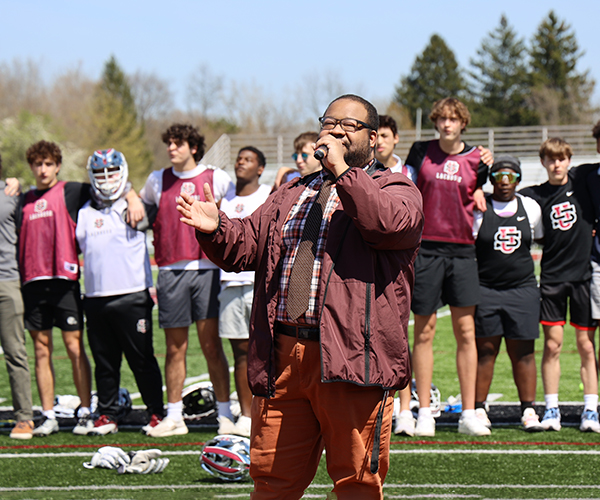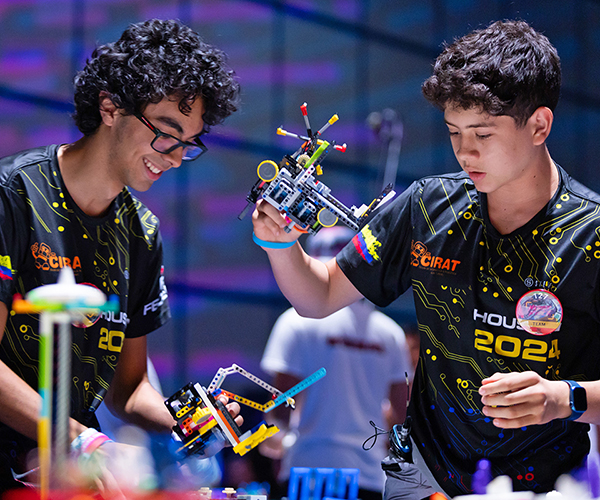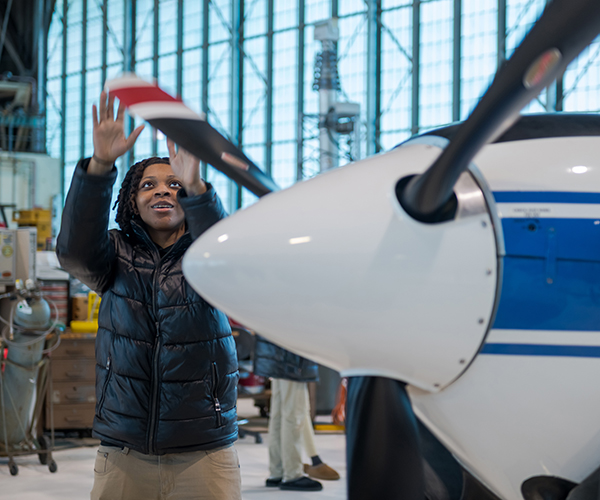Q: What are the benefits of attending an all-girls school?
A: "In a single-gender school, students have the ability to recognize and exercise their optimal individual style of learning. Students are more comfortable asking questions, and this helps them recognize their best learning style," says Sister Carol Anne Smith, president of Magnificat High School. "Going to an all-girls school definitely inspires a can-do attitude. The culture says you are involved; you're not a bystander, so lead and step forward. That gives them confidence. It's the combination of the community, the culture, and the climate that an all-girls school offers that really makes it a powerful and transformative experience."
Q: What is the value of service learning in early education?
A: "It's about understanding responsibility," says Bradley Gill, director of the Lower School at Hawken. "From the smallest of students up to the fifth grade, all students participate in service. The experiences that we hope to deliver grow a little bit each year. We have a schoolwide program where each grade level works with a community group. Each year, one of our groups works with homelessness and hunger, and another works with donations of medical supplies. Empathy is something that shines through. There is a realignment of some of their priorities. They develop a sense of global-mindedness. I think they are humbled by the experience."
Q: Why is a 21st-century science education important?
A: "I looked at the science section in The New York Times and all the topics that typically get discussed there," says Deanne Nowak, dean of institutional and curriculum research, and an instructor in science at Gilmour Academy. "These articles are written for the lay population, but in order to understand and to be interested in them, you need to know a lot of basics in the sciences. In order to be a literate citizen, you need to have some basics in order to understand what's going on in the world. To make decisions about your life in order to be a good citizen, you have to have some scientific background."
Q: Why is it important for students to learn multiple foreign languages in this global environment?
A: "It's important for students to learn other languages because language is such an important part of culture and understanding other cultures and perspectives and attitudes," says Gary Di Bianca, chair of foreign languages at Andrews Osborne Academy. "It really helps us become a better globalized society. Having multiple lenses that we can really see and understand people with is going to be enhanced by knowing their language. We have always taught Spanish and French at Andrews Osborne, and we are just starting a Mandarin Chinese program."
Q: How are global education and studying abroad important?
A: "It's one thing to read about what's going on in the rest of the world, but it's another thing to experience the ways of people from different countries with different traditions and different cultures and languages, to really step into their shoes and really see what their outlook on life is and what happens day to day," says William Christ, Hathaway Brown head of school. "When you give high school students that kind of an outlook [from going abroad], it really changes everything. They are really prepared to look at the world differently, to look at the U.S. differently, as it appears from different longitudes and latitudes, and feel comfortable developing a global outlook. So by the time they enter college, they're already well-informed and they've already had the transformative experience of going abroad."
Q: Why are the arts important in education?
A: "All of the arts teach students to look at and interact with their medium — whether it's music or pottery or stage or painting — and find something beautiful. It gives them a critical eye early on," says Tim Unger, director of Lake Ridge Academy School of Fine Arts. "It gives them the tools and the experience to look at something and be able to evaluate it and analyze it and break it apart and understand it. The arts encourage students to bring themselves to the table and to bring their own experiences and backgrounds to the table and incorporate that into their artistic expression."
Q: How can an all-girls education benefit girls in math and science?
A: "The girls are more likely to take higher level math and science courses because they have less fear of failure than in a coeducation environment," says Mary Ann Corrigan-Davis, president of St. Joseph Academy. "They are in a place where they assume all of the leadership roles of the school, from class officers to editor of the paper and yearbook. They also care more about their performance over their appearance because they don't have to worry about being labeled nerdy or anything like that. They're just encouraged to be their very, very best."
Q: How can parents of eighth-graders prepare their children for applying to an independent high school?
A: "We encourage them to be involved in the process," says Kieran Patton, admissions and advancement director at Benedictine High School. "Obviously, visit the school, have their sons shadow, start the process of entrance exams that most of the Catholic high schools would offer and then attend any of the events open to them. Get to know the people that they are going entrust their sons to. We feel we have a personal touch. There is a definite community feeling that you'll have here. We want them to feel that, and the way they're going to feel that is [by] being involved and being here."
Q: What are the benefits of a residential environment to a student?
A: "The residential environment provides an education that goes beyond 8 a.m. to 3 p.m.," says William Bugg, assistant head of school at Western Reserve Academy. "It goes beyond the five days a week that most schools operate in. We are literally involved in the kids' lives 24 hours a day, 7 days a week. It means that the kids see their teachers at breakfast, lunch and dinner. We have weekend activities, including Indians' games and going to Blossom to see the Cleveland Orchestra. The kids get involved with volunteer activities in the community, working with Habitat for Humanity and local food banks."
Q: What are the benefits of small class sizes in helping students to thrive?
A: "When a student thrives, they feel empowered to pursue their own learning," says Larry Goodman, interim head of school at The Lillian and Betty Ratner School. "For that to happen, a school must be willing to create a slightly different environment for each kid. At the Ratner School, we wouldn't think, In seventh-grade we teach X. We would instead say it depends on the seventh-grader: Some do algebra, some do pre-algebra and some do geometry. What we really mean when we say, •where every child thrives,' is being able to provide almost 165 learning environments for our 165 students."
Q: How does the Montessori method fit into 21st-century learning?
A: "We're moving away from the •teach the test' kind of model and that kind of linear curriculum into a more integrated, interrelated curriculum design," says Gordon Maas, head of school at Ruffing Montessori. "By taking subject matter and not presenting it in isolation, but in integration, this design allows for a sort of cross-cultural thinking. It allows the students to evaluate their own learning in ways that are not limited to tests. It shows them how one specific aspect of their learning has the possibility of crossing over into a number of different areas. This is an innovative approach Montessori schools have been using for over 100 years."
Q: How can studying entrepreneurship help students inside and outside of the classroom?
A: "Our focus is very much on experiential learning," says Greg Malkin, director of University School's Entrepreneur Institute. "It's not economics. It's a much more •in the trenches' sort of look at things. We do summer apprenticeships where students work one on one with a local entrepreneur. They actually sit in on meetings, listen in on sales calls, and do a strategic project for the company that's more than just busy work. They learn what it's really like to run a business. Our vision is to expose them to learning not only in the classroom setting but more importantly, to experience entrepreneurship and give back to the community."
Q: How does a Jesuit education prepare students for college and beyond?
A: "We have high expectations for all of our students," says Pat O'Rourke, director of admissions at St. Ignatius High School. "Allowing teachers to challenge them to reach new heights. One hundred percent of our graduates go on to college. Our greater purpose, however, is more than education. It is about formation. We do not just impart knowledge; we shape the hearts of our students as well. Our commitment to service is the very core of our Catholic, Ignatian identity. This experience stays with our students well beyond college, forming them for life."
Q: In what ways does The Agnon School integrate Judaic studies with general studies?
A: "Similar to other day schools, we integrate Judaics into core subjects," says Jerry D. Isaak-Shapiro, head of school at the Agnon School. "But we also integrate all the arts. Art, music and technology are taught alongside Hebrew, biblical studies, Jewish history, social studies, math and language arts. We have something in our eighth grade called the Integrated Project. Students choose either a concept or an era in time and follow that the entire year through the lens of all the disciplines. At the end of the year, they then present what they've discovered to an audience."
Q: Why is college counseling an important part of a high school education?
A: "We see it as a process that has to start early on," says Mary Grimaldi, director of college counseling at Beaumont School. "We actually begin the process sophomore year with a group guidance class. We bring in an admissions officer from a competitive college. We also have a parent meeting. The whole process is a collaborative effort between schools, the guidance counselors, parents and students. I also have every junior and her parents meet with me. It's a process where they do it in groups, and we also focus on the individual. Ultimately, the goal is to have them select a college, matriculate at a college and graduate from that college without transferring."
Q: What makes Montessori High School's placement in University Circle unique?
A: "We have relationships with the Botanical Garden, Cleveland Museum of Art, the Natural History Museum, Cleveland Institute of Art and Case," says Carrie Barnabei, Montessori High School's director of community participation. "It's a great learning experience for the kids to be able to use experts in the community. Through the Botanical Garden and the Natural History Museum, we are going to build a greenhouse on our campus. The kids will be growing their own vegetables on campus and then using that as part of their lunches."
Q: How does Lawrence School use technology to help students with learning differences?
A: "The goal of our technology usage at the upper school in particular is to assist students in learning any which way," says Sally Garza, Lawrence School upper school director of technology. "Some students use tablet computers. Other students use something called text speech, which alleviates the task of decoding and reading. Other students use software like speech-to-text, which they will speak and the computer will actually type for them. It allows them to be independent in their learning."
Q: How does the Center for Research on Girls impact an education at the Laurel School?
A: "The Center for Research on Girls helps us put the world's best research to work for girls," says Lisa Damour, director of the Center for Research on Girls at Laurel School. "We scan the academic literature and implement findings that help us teach girls using cutting-edge methods. We also collaborate with university colleagues to conduct research on the most pressing issues related to the lives of girls. Having the Center for Research on Girls at Laurel means that our faculty and parents always have access to salient research about how to help girls learn and grow."
Q: How can career planning help students when starting out in the college process?
A: "Twenty five percent of incoming freshman will start off undecided, and six out of 10 students have changed their major two or three times," says T. David Garcia, Kent State University's vice president of enrollment management. "That all comes back to not knowing what they want to do. Parents and high school students need to sit down at the kitchen table starting junior year and begin having that type of discussion. I think it's also important for students to look into the Career Services section of the college and university websites or use resources at their guidance counselor's office. Students need to take ownership and investigate to find a career they want to pursue that matches their strengths."
Q: How will the net price calculator help students determine college affordability?
A: "Net price calculators are required by the federal government to be on every college website by October, and they are going to change when families have access to financial information," says Brian Williams, John Carroll University's vice president of enrollment. "Historically, students apply for college admissions, find out if they're accepted and then find out financial aid at the end of the process. The net price calculator will inform families about scholarship and grant opportunities that will allow them to compare the real price between institutions much earlier in the process. Students who felt sticker shock before may apply to John Carroll and other private schools now because they understand what they are paying once aid sources are applied."
Q: What makes Cleveland State University an attractive school for incoming freshmen and transferring students?
A: "We have wonderful connections throughout the city," says Heike Heinrich, director of undergraduate admissions at Cleveland State University. "It really gives students a leg up for employment in the future. We have wonderful alliances with the Cleveland Clinic, so we have a lot of students coming into the medical profession. We have so many different experiences you can get here; we have more than 200 majors. We have a little bit of something for everyone."
Q: What is the benefit for students in attending Lorain County Community College's University Partnership?
A: "At LCCC's University Partnership, students are able to continue on to earn their bachelor's degrees or master's degrees without leaving Lorain County," says John Crooks, associate provost, LCCC University Partnership. "In many of the programs, they can do three years of class work at LCCC and transfer to their bachelor's degree program, saving a substantial amount on their tuition. Thirty-one bachelor's degrees and nine master's degrees from eight universities are offered on the LCCC campus through the University Partnership, giving students a great choice of programs."
Q: How does Baldwin-Wallace's four-year guarantee program benefit students and their families?
A: "It's a program that students sign up for by signing a written contract," saysSusan Dileno, vice president of enrollment at Baldwin-Wallace College. "They then follow certain conditions to make sure that they get out in the four-year time frame. They have to sit down with their adviser to map out their four-year plan of coursework. If they do that, Baldwin-Wallace will pay up to two semesters of their tuition. With college tuitions being what they are, it's really critical for us to remain affordable for a family."
Q: How is the University of Phoenix addressing the skills crisis in today's job market?
A: "The demand is for skilled workers, and that demand is definitely not going to slow down," says Gina Cuffari, vice president of Ohio campuses for the University of Phoenix. "In my opinion, the need is for education and training to be accessible so that people can advance their skills to be prepared for the jobs as they become available without putting their lives and responsibilities on hold. That speaks to the mission of the University of Phoenix, which is to provide access to education for working students."
Q: What are the benefits of Hondros College's new RN-to-BSN online degree nursing program?
A: "The RN-to-BSN online degree program allows a licensed, registered nurse, who has an associate's degree, to complete their bachelor of science in nursing degree in a year," says Penni-Lynn Rolen, Hondros College's dean of nursing programs. "It's online, so it's designed to accommodate the schedule of a working nurse. The profession of nursing is evolving, and baccalaureate level of preparation needs to be a goal for all nurses. Hospitals are looking for that baccalaureate-prepared nurse as health care becomes more complex and patients are requiring a higher level of care. Further education prepares the nurse to meet the needs of those patients."



